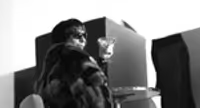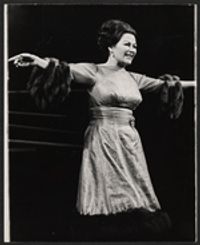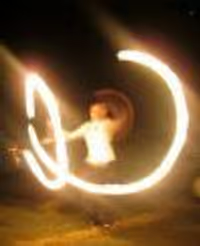Follies OBC: What was Cut/Changed/Slowed Down/etc.
#25Follies OBC: What was Cut/Changed/Slowed Down/etc.
Posted: 6/16/10 at 3:01pm
I don't care that the OBC is incomplete--none of the others have the spark and mystique the Capitol recording has. It truly has a haunted sound.
I prefer the concert version to the Papermill for the same reason. The Papermill feels like it knows it is important, archival even, and lacks atmosphere.
I go back and forth on the London cast, but it's almost a different show completely.
#26Follies OBC: What was Cut/Changed/Slowed Down/etc.
Posted: 6/16/10 at 3:04pmWell, I just bought the Original, and will be listening to it later today. For some reason, when I hit "purchase" I had the hardest time actually doing it. Maybe my old concerns from before were creeping up, but I went with it, and I'm sure I made the right choice.
#27Follies OBC: What was Cut/Changed/Slowed Down/etc.
Posted: 6/16/10 at 3:52pm
Ann Miller and Sondheim didn't battle. He let her do exactly what she wanted to do with it on stage, telling her not to change a thing. In the studio, though, he wanted it slowed down and indeed, the tempos on the Paper Mill recording were metered to exactly what Sondheim wanted them to be. Miller didn't like the slow tempo, but she did it, respecting Sondheim's wishes.
And yes, dialogue - including Sally's entrance speech and her "I remember him..." after "The Road You Didn't Take" - was recorded, but cut thanks to the Widow Goldman.
Phyllis Rogers Stone
Broadway Legend Joined: 9/16/07
#28Follies OBC: What was Cut/Changed/Slowed Down/etc.
Posted: 6/16/10 at 3:54pmI knew Smaxie would set the record straight!
#29Follies OBC: What was Cut/Changed/Slowed Down/etc.
Posted: 6/16/10 at 3:56pm
And yes, dialogue - including Sally's entrance speech was recorded, but cut thanks to the Widow Goldman.
GRRRRRRRRR. ![]()
#30Follies OBC: What was Cut/Changed/Slowed Down/etc.
Posted: 6/16/10 at 3:58pmI'd kill my boyfriend myself if it meant that, for the rest of my life, I could be referred to as The Widow Gurland. Even in prison.
#31Follies OBC: What was Cut/Changed/Slowed Down/etc.
Posted: 6/16/10 at 4:05pm
Edna, if you can afford it, get your hands on the Scrabble album. It’s a great supplement to any Sondheim recording, but especially Follies. Ethel Shutta gets to do a hilarious full length “Broadway Baby” and the original cast performs several songs, including the cut “Pleasant Little Kingdom.” My favorite “I’m Still Here” is Nancy Walker’s rendition from that album.
Temms, that was an awesome post. As much as we kvetch about the cast album, it is kind of a rite of passage seeking out those grainy videos and recordings, checking out yellowed librettos from the library and talking to those who were actually there.
Frontrowcentre, the audience’s excitement as Arthur Rubin’s voice fades and Carol Burnett comes down the stairs during “Beautiful Girls” is worth the price of the Concert recording alone. It too was my introduction to the (nearly) complete score. In fact, I owned it long before I owned the OBC. Yet, I always find myself skipping Patinkin’s tracks.
Twinbelters, I rarely listen to the Paper Mill either. It just lacks the excitement of the other recordings. And the tempos bother me.
And really, isn’t hating the Widow Goldman an essential part of loving Follies?
Updated On: 6/16/10 at 04:05 PM
#32Follies OBC: What was Cut/Changed/Slowed Down/etc.
Posted: 6/16/10 at 4:07pmI kinda hate Goldman too.
#33Follies OBC: What was Cut/Changed/Slowed Down/etc.
Posted: 6/16/10 at 6:59pm
God, I just love reading about Follies :)
and Temms- that was, of course, absolutely amazing.
But I think that Follies is one of a handful of reasons why I love theatre so much. It's what it's all about. But I have a confession to make; I own the '85 album, I own the Scrabble album, I've read the script and the Chapin book and listened to the faded bootlegs and some of the OBC on youtube... I do not own the OBC. I will go fix this immediately.
But thanks to all of you people who have worked to keep Follies and other worthy shows alive. Pieces of art like Follies are the reason I make theatre my life.
Thanks for everyone
#34Follies OBC: What was Cut/Changed/Slowed Down/etc.
Posted: 6/16/10 at 7:20pm
Beautiful post, temms.
I learn so much from the Follies threads on this board. Thank you everyone who has contributed or will contribute.
#35Follies OBC: What was Cut/Changed/Slowed Down/etc.
Posted: 6/17/10 at 4:02amOnce you hear one recording of Follies, you end up NEEDING the others, no matter how unsatisfactory or incomplete they may be.
#36Follies OBC: What was Cut/Changed/Slowed Down/etc.
Posted: 6/17/10 at 10:42am
Once you hear one recording of Follies, you end up NEEDING the others, no matter how unsatisfactory or incomplete they may be.
Exactly. Totally true. I only wish there were more recordings. I would even have taken a cast recording of the less than stellar 2001 cast, just because it would mean more Follies!
Gothampc
Broadway Legend Joined: 5/20/03
#37Follies OBC: What was Cut/Changed/Slowed Down/etc.
Posted: 6/17/10 at 11:02amWhy would the widow withhold dialouge? Was it a money issue or did she just not think the dialouge was a good representation of her husband's work?
#38Follies OBC: What was Cut/Changed/Slowed Down/etc.
Posted: 6/17/10 at 11:42am

The Widow Goldman would not permit the recording of any dialogue not used on previous Follies recordings or any dialogue without underscoring. As to why - for some reason, Goldman controls the first class rights for Follies and she did it simply because she could.
#39Follies OBC: What was Cut/Changed/Slowed Down/etc.
Posted: 6/17/10 at 12:08pm
I would even have taken a cast recording of the less than stellar 2001 cast, just because it would mean more Follies!
No, ljay, anything but that. The Roundabout Follies is what made me the bitter man I am today.
#40Follies OBC: What was Cut/Changed/Slowed Down/etc.
Posted: 6/17/10 at 12:11pm
The Roundabout Follies is what made me the bitter man I am today.
AH! THAT's the reason?
I didn't see the revival, but I've "heard" it. The singing probably would have come across fine on a recording... well maybe excluding Judith Ivey struggling to hit soprano notes.
I can't wait for FOLLIES 2011 at the Kennedy Center. I hope it's not a disaster! Will Widow Goldman be involved with that production? She's still alive, right?
Updated On: 6/17/10 at 12:11 PM
Gothampc
Broadway Legend Joined: 5/20/03
#41Follies OBC: What was Cut/Changed/Slowed Down/etc.
Posted: 6/17/10 at 12:32pm
"The Roundabout Follies is what made me the bitter man I am today."
Somehow I don't think that's it. Although I can see why you would think that. Blythe Danner's croaking voice was annoying. And Polly Bergen's Carlotta had all the sex appeal of a hot water bottle.
#42Follies OBC: What was Cut/Changed/Slowed Down/etc.
Posted: 6/17/10 at 1:33pm
Oh, the sorrow caused by that awful Roundabout production... I left the theatre miserable.
But I love Judy Ivey - she was the only one with the right mind, the right energy. Blythe was a tired old woman with plastic surgery. Treat & Harrison were 70 year old men in well preserved bodies, but lackluster.
Remember, it's 1971; the Follies were produced "between the wars," so Phyllis & Sally couldn't have done it any later than 1941 (and not much earlier, since the boys go to war during the girls time in the show), so these four are probably only 50-55 years old AT THE OLDEST, and most of the cast was from the nursing home.
The orchestra was abominably small (thanks again, Roundabout). Carol Woods...? The old broads didn't bother to dance for "Who's That Woman," so that made no sense at all. Why did the Whitmans dance the Bolero? (I know, to save money by not hiring a couple to play Vincent & Vanessa).
So much missed opportunity...
Updated On: 6/17/10 at 01:33 PM
Phyllis Rogers Stone
Broadway Legend Joined: 9/16/07
#43Follies OBC: What was Cut/Changed/Slowed Down/etc.
Posted: 6/17/10 at 1:37pm
Remember, it's 1971; the Follies were produced "between the wars," so Phyllis & Sally couldn't have done it any earlier than 1941, so these four are probably only 50-55 years old AT THE OLDEST, and most of the cast was from the nursing home.
At least in the original script, Sally and Phyllis are specifically mentioned as being 49. Ben is 53. Productions ALWAYS skew too old. Carlotta is supposed to be the same age as them, too, and she's usually cast waaaay too old, too.
#44Follies OBC: What was Cut/Changed/Slowed Down/etc.
Posted: 6/17/10 at 1:40pm
Well Sally and Phyllis ARE 49. And that's in the script. I'm not sure what I think about Bernadette Peters possibly playing Sally next year. Sure she she can pass for 49, but I'm just not sure if she's 100% right for the role. I think Marin Mazzie is a better fit. I also would have loved to see what Alice Ripley could do with it if she got her voice back in shape, but she'll be busy touring.
*Edit. Just saw Phyllis mentioned about their ages being in the script too.
Updated On: 6/17/10 at 01:40 PM
#45Follies OBC: What was Cut/Changed/Slowed Down/etc.
Posted: 6/17/10 at 1:47pm
Mazzie is too hoyden-ish (on my opinion) to be Sally; she should convey a sort of fragility, since her mind has, after all, completely fallen apart. I suppose I could see her as Phyllis, but a much more vulgar Phyllis than would be ideal.
I actually kind of like the Peters idea - she is still a little girl in an old woman's body - there will always be the aging kewpie thing about her, which could work in her favor as Sally (like the tragic character in Twigs who can't forget her brief stint as a flower in an old Hollywood musical).
#46Follies OBC: What was Cut/Changed/Slowed Down/etc.
Posted: 6/17/10 at 1:51pmMazzie is taking on a role that is even more fragile and vulnerable than Sally. Diana in N2N. The roles actually share quite a few similarities. If she's a success as Diana, I don't see why she couldn't work as Sally.
#47Follies OBC: What was Cut/Changed/Slowed Down/etc.
Posted: 6/17/10 at 1:55pm
Although they both have issues with mental stability, I don't see much in common - Diana is a much more vulgar, hard person than Sally. Sally is a marshmallow, a flower, much softer and of an entirely different era.
Diana is also more of a modern woman, i.e. a girl in an older body. Sally is a woman.
As for Phyllis, I'd like to see Michele Pawk. She plays those woman of another era exceptionally well, and the score would sit well in her (current) voice.
#48Follies OBC: What was Cut/Changed/Slowed Down/etc.
Posted: 6/17/10 at 1:59pmSome people have described Sally as the villain of the piece. I think she's way more in control of what's doing opposed to Diana. I've read Dorothy Collins' Sally described as innocent and childlike. I think there's room to portray both aspects of the character.
#49Follies OBC: What was Cut/Changed/Slowed Down/etc.
Posted: 6/17/10 at 2:01pmI think Sally has to break your heart, not make you hiss.
Videos









